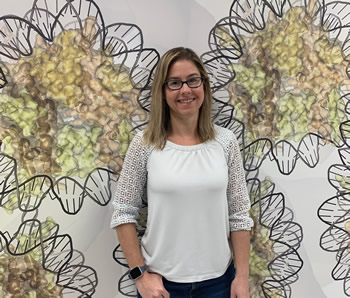Dr. Elizabeth TranBy Dr. Nik Tsotakos  Dr. Elizabeth Tran is a Professor of Biochemistry at Purdue University and has been recognized with a number of honors and awards, including the RNA Society’s Outstanding Service Award in 2018. Dr. Tran has long been interested in understanding the mechanisms of RNA helicases, the roles of lncRNAs, and how each of these is misregulated in cancer. Dr. Tran received her PhD from North Carolina State University, where she developed an assembly and methylation system for C/D box snoRNAs, working with Dr. Stuart Maxwell. She then completed a postdoc with Dr. Wente at the Vanderbilt University Medical Center in Nashville, TN, where she studied the mechanism of mRNA export from the nucleus. In her own lab at Purdue, Dr. Tran’s philosophy is to “ask one simple question and then follow with another question that resulted from the answer.” She explained, “When I started my laboratory over 10 years ago, I aimed to study an under-investigated member of the DEAD-box RNA helicase family in S. cerevisiae called Dbp2 and then use the knowledge gained to expand my studies to other members of this class. However, Dbp2 turned out to be a really interesting enzyme with many different functions in the cell, leading us down a series of sequential questions. Our first question was simple: What does Dbp2 do in a cell? The answer turned out to be that it promotes transcription termination of RNAPII protein-coding and non-coding genes.” Which, as any scientist can attest, only led to more questions. Dr. Tran describes, “The next question was, “What happens to genes targeted by long non-coding RNAs when Dbp2 isn’t around?” The answer to that question then lead to insights into lncRNA functions. “Once we had enough insight into Dbp2 in the simple budding yeast model system, it was then time to move to the Dbp2 ortholog in mammalian cells, DDX5, and ask if the roles we’ve discovered in yeast are conserved and if they explain the correlation between DDX5 overexpression and cancer.” She is currently thrilled about one of her current research directions. She explains, “I’m very excited about our newest work on the small cell lung cancer. It is a devastating cancer with a median survival of ~10 months and no effective chemotherapeutic options. The long-term goal of my research program has always been to understand how the misregulation of RNA helicases is linked to tumorigenesis. My initial aim was to take a step-by-step approach to this problem, beginning first with biochemistry and molecular biology, which then informed our current studies in human disease. There are so many questions about helicases that have yet to be addressed.”
But science also comes with a variety of challenges, and for Dr. Tran, some of the greatest ones started early in her career. She remembered, “having a child in graduate school [was a major challenge]. We were pretty poor and couldn’t afford childcare. My husband was a paramedic at the time and worked 24 hour shifts every other day. We ended up taking turns working and taking care of our daughter, basically just ‘high fiving’ each other and handing off a baby as we traded turns going to work. I got through it by becoming very organized and making to do lists, so that when I walked into the lab, even if I hadn’t slept the night before, I knew what to do. Oh, and coffee. Lots of coffee!” In the lab, Dr. Maxwell, her thesis advisor gave her the best advice. She says, “[he] told me that good scientists always make it. I think this was one day when I was frustrated at the bench and exhausted because of a new baby at home. It’s important to be positive and keep going, even when it’s hard. It works out in the end, even if the journey to that point follows a different trajectory than you might have anticipated.” For junior scientists, Dr. Tran feels like her advising duties never end, and she stays in touch with her advisees even after they move on from her lab. She has two pieces of advice for young scientists: “1) Don’t get stuck in your model/hypothesis. Results that don’t fit the model or prove the hypothesis are almost always the most interesting ones, and 2) Get involved with the scientific community. The joy you will feel and the connections that you make are priceless.” Dr. Tran is also an active citizen, having been elected to the Wabash Township Advisory Board in West Lafayette. When asked about it, she considers science literacy a very important asset for public officials. She said, “It’s essential. Look at the state of society right now with mass misinformation everywhere you look. Decisions by our government officials impact the environment, our health, our food, and our well-being. There has to be a baseline level of scientific literacy for politicians to communicate with scientific advisors and to do their jobs effectively. The lack of scientific literacy is among government officials and society at large is a huge issue.” And her favorite RNA Society experience? “I really enjoyed helping Lynne Maquat organize the first Women in Society/Science in Society event as a postdoc. That was a fun time and it was a great experience as a junior scientist.” The best way to connect with Dr. Tran is in LinkedIn, but you can also visit her lab’s website at https://ag.purdue.edu/biochem/tranlabrna/ |
